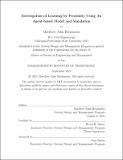| dc.contributor.advisor | Moser, Bryan R. | |
| dc.contributor.author | Hernandez, Matthew John | |
| dc.date.accessioned | 2022-02-07T15:19:47Z | |
| dc.date.available | 2022-02-07T15:19:47Z | |
| dc.date.issued | 2021-09 | |
| dc.date.submitted | 2021-10-21T19:54:49.834Z | |
| dc.identifier.uri | https://hdl.handle.net/1721.1/140027 | |
| dc.description.abstract | This thesis investigates individual and organizational learning, focusing on the impacts of knowledge acquisition and transfer due to cognitive, social, and organizational proximity. A literature review on individual, team, and organizational learning identified how knowledge is acquired and transferred. Knowledge can be broken down into two main categories, explicit and tacit. Tacit knowledge is difficult to articulate and transmit but can frequently occur through collaboration. Simulation analyses using an agent-based model was utilized to explore collaboration as a mechanism for knowledge transfer. Large cognitive distances showed significant increases in collaboration times and a decrease in overall organizational performance. Agents with no prior experience will acquire more knowledge when placed on mixed skilled teams than similarly skilled teams but at the cost of more senior agents’ ability to complete their work demands. With more data readily available, organizations should be more intentional about talent management regarding the development of new skills to penetrate an organization. | |
| dc.publisher | Massachusetts Institute of Technology | |
| dc.rights | In Copyright - Educational Use Permitted | |
| dc.rights | Copyright retained by author(s) | |
| dc.rights.uri | https://rightsstatements.org/page/InC-EDU/1.0/ | |
| dc.title | Investigation of Learning by Proximity Using An Agent-based Model and Simulation | |
| dc.type | Thesis | |
| dc.description.degree | S.M. | |
| dc.contributor.department | System Design and Management Program. | |
| mit.thesis.degree | Master | |
| thesis.degree.name | Master of Science in Engineering and Management | |
